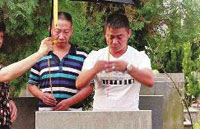Yu Zhengsheng: A reformer's style
(Xinhua) Updated: 2012-12-24 22:03Reformer
A year after Yu arrived in Shanghai from Hubei Province, the economic hub of China began to feel the bite of the global financial crisis. The city also faced challenges in economic transformation, as required by the central government.
The economic growth in Shanghai saw a drop from previous double-digit increases during his five-year tenure in the city. Old Yu, however, asked local officials to remain calm and not to be envious of other regions.
"We must push forward economic transformation, but transformation is not as easy as strolling in a park or sunbathing on the seashore," he told local officials.
"We should throw away the concern of our personal gains and losses and have courage to endure temporary days without the spotlight. We must break through barriers one by one to facilitate transformation."
Despite the economic slowdown, the transformation strategy began to work as the city saw rising fiscal revenue, the tertiary industry's account in gross domestic product and other indices that are taken as symbols of economic quality.
Now Shanghai is making efforts to build an international financial center and an international shipping center, both part of the national development strategy.
The city also piloted reform of replacing turnover tax with value-added tax (VAT), seeking a breakthrough in a most significant finance and taxation reform in two decades. This reform was launched in a bid to lower the overall tax burden and boost certain sectors, such as service industries.
- China's lunar probe confirms no water on the moon
- Minister: PLA to firmly protect maritime rights
- China raises alert level ahead of Typhoon Nida
- Japanese suspect detained in security inquiry
- China starts building its first polar icebreaker
- China warns of typhoon, floods
- New bus in south China makes emergency escape easier
- Drunk driving blamed for Taiwan bus accident
- Xi: Disaster relief must be improved
- China's push to improve output of research leads way









